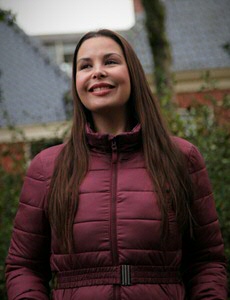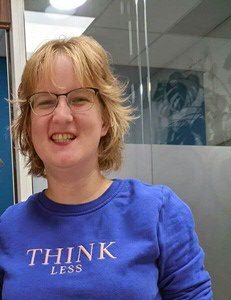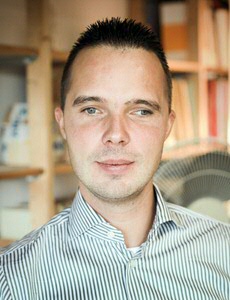Lift to the inclusive workplace
There is plenty of work, and yet people with a disability are still often sidelined. One plus one is two, or so you’d think: this is the perfect time to help this group of workers find a job. The intention is there, also within the University, but implementation seems to stall at times. Plenty of work there, says Charlotte Venema, Project Manager for the Job Agreement Act at the UG.
Awareness is growing that everyone should have a place in the job market. Businesses and organizations understand that unconscious bias plays a role in the job application process, and that it is important to make room for everyone who diverges for what was considered for years to be the standard – white, male, heterosexual.
And yet, with this growing awareness, one group still tends to be forgotten, says Charlotte Venema, Project Manager for the Job Agreement Act at the UG: job applicants with a disability. This is a great pity, in her opinion. Not only because of the many hard-to-fill vacancies, but mostly because it means that this group’s potential remains untapped.

Resistance
The UG currently has approximately 80 ‘afspraakbanen’: positions filled with people with an occupational disability. These jobs stem from the Job Agreement that the government made with the Netherlands Employees Insurance Agency (UWV) and a number of other institutions. The ambition is for the UG to offer 200 such jobs by 2026. If it was up to Venema, this would already have happened, but it turns out to be not so easy. ‘Some faculties and service units, such as the Faculty of Law, are really doing their best to hire staff with a disability. In other places, there is more resistance.’
Resistance is not necessarily the same as unwillingness, she explains. ‘Supervisors are often concerned about the consequences of hiring someone with a disability. It costs more money and more time, and can we offer this person the support and guidance they need?’ Some of these concerns are well-founded, Venema admits: it does often cost more time to familiarize a person with a disability with a new job, and sometimes, practical adjustments to the workplace are required.
Job coaches
But many other concerns are unfounded. Money? UWV supports the UG in the costs. ‘As for support, the employer is not solely responsible for this, there are also special job coaches: Rather than offering work-related advice, they offer tips on how to deal with the disability and provide a listening ear.'
Venema believes that what is more important than providing this kind of information is making people enthusiastic. She wants to show not only that many of these concerns are unfounded, but also and foremost how much added value is offered by an inclusive workplace. ‘There are so many extremely talented people with a disability. This talent remains untapped if they are not allowed to work. In addition, their arrival also brings changes in the workplace. If there is room for people with a disability, this also creates room for their colleagues without a disability to share what they struggle with. Illness, stress, or fear of failure, for example.’
Once the number of staff members with a disability grows, job seekers with a disability will hopefully become aware of the UG as a potential employer. The University is a great employer for people with a disability, she says. ‘It is a large, rather sluggish organization. This can be inconvenient at times, because change tends to be slow, but this slowness is also what makes the University a very stable employer. After all, a university never goes bankrupt.’

Mental health disability
Anke Marije Huisman (34) is a communications officer at the UG and she has a mental health disability. She studied Classics, but did not complete her Bachelor’s degree. She later completed a first-year programme in Law at a university of applied sciences.
‘I come from the Wajong benefit system, so I come with a bag of money.’ That is how Anke Marije Huisman straightforwardly explained it during her job interview. That way, her potential new supervisor immediately knew how things stood: Huisman has a disability, but as her employer, you have access to all kinds of subsidies.
One of the consequences of her disability is that she is more easily tired and over-stimulated than most of her colleagues. A full working week is not realistic for her, although half a week is. ‘At first, I worked twelve hours a week. In the early days, I always had to sleep for an hour after a half-day's work. But I recently asked whether I could increase my working hours to 20.’ And yes, her colleagues had to get used to it, for example to the fact that she easily gets over-stimulated. ‘But after a month or two, they understood how I work, and they also began to see that I have much to contribute. In terms of content, but also because I can do tasks that they do not have the time for, like digital archiving.’
Huisman knows that employers often fear potential problems when a person with a disability applies for a job. They are for example concerned that this person will need a lot of support. In her opinion, this is not something employers should become fixated on. ‘There are also many people without a disability who sometimes need a chat. And someone who suffers from a burn-out will also need additional support for a while.’
Furthermore, the employee’s supervisor is not the only person responsible for providing support. ‘I got and still get a lot of help from my job coach from outside the University. If I struggle with something, I talk to her about it, and she always helps me find me a fresh perspective.’

Partially sighted
Bas Tadema (30) is a PhD student in Constitutional and Administrative Law at the UG, and he is partially sighted. He completed a Bachelor’s degree in Law at Windesheim, and a Master’s in Constitutional and Administrative law at the UG.
Looking for source materials can be quite a challenge if you are partially sighted. As is working through the annotations of your thesis supervisors. But Bas Tadema has one great ‘resource’ at his disposal: his student assistant. ‘She helps me for a few hours a week with these kinds of practical matters. It’s incredibly useful and really nice.’
In this way, Tadema has found more solutions to practical problems. Sometimes in consultation with the Faculty, sometimes of his own initiative. When he noticed that the floors in the Faculty lift were not market in Braille, he added Braille stickers himself. It is not ideal, of course: it would be better if the University took care of such things.
Sometimes, they are completely off the radar. The Faculty recently introduced new coffee machines. With a touch screen. Oops! That won’t work for someone with a visual impairment. ‘When the Faculty contacted the manufacturer, it turned out that there were separate devices that translated the text on the touch screen into Braille. In the end, there is often a solution, but it does feel at times like fighting a running battle. You could avoid a lot of hassle by thinking about it from the start.’
He does see some progress. For the construction of a new Faculty building, employees with a disability were asked to think along about accessibility and user-friendliness. Partly as a result of this consultation, the new building plan includes quiet, stimulus-free spaces. ‘I hope that once the new building is open, the University will clearly communicate why it made these choices. It is important to emphasize it, in order to raise awareness.’
This article has been taken from our alumni magazine Broerstraat 5. Text: Dorien Vrieling
More information
Check this website to read more about the 'Participatiewet' (in Dutch).
More news
-
15 September 2025
Successful visit to the UG by Rector of Institut Teknologi Bandung
